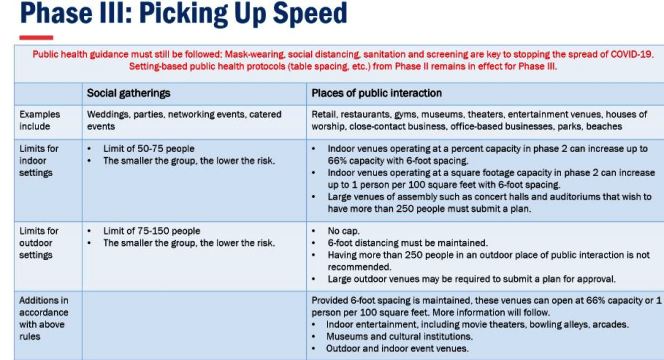
Rhode Island to Move to Phase 3 Tuesday, Governor Extends Executive Orders
Governor Gina M. Raimondo and Nicole Alexander-Scott, MD, MPH, the Director of the Rhode Island Department of Health (RIDOH) provided details today on the state’s response to COVID-19.
After announcing that Rhode Island will move into Phase 3 on Tuesday, June 30th, Governor Raimondo laid out the following guidance for Phase 3:
- Social gatherings: Social gatherings can be no larger than 25 people indoors or 50 people outdoors. For social gatherings like weddings where there is a licensed caterer involved (which makes the setting more like a restaurant) gatherings can be as large as 50 people indoors or up to 100 people outdoors.
- Public events: Public events can be up to 125 people indoors or up to 250 people outdoors. Any organizers planning to host a group of more than 100 people will need to submit plans to Commerce RI.
- Indoor settings: All indoor settings operating at a square footage capacity can increase up to one person per 100 square feet, provided that everyone maintains six feet of social distance. All indoor settings currently operating at a percent capacity cap can still increase up to 66% capacity provided that everyone maintains six feet of social distance. This includes places like offices and restaurants. Seated venues can open at up to 66% capacity, and free-flowing venues can open at 100 square feet per person, provided that everyone maintains six feet of social distance.
- Travel: Rhode Island will implement a mandatory 14-day quarantine for anyone coming to Rhode Island from any state with 5% or greater positivity rate. (Positivity rates are calculated using the average daily positivity rate for the last seven days.) As an exception, people will not have to quarantine if they have had a negative COVID-19 test within the past 72 hours. (If someone is tested after arriving in Rhode Island and gets a negative result, that person can stop quarantining.) The list of states with a percent positive rate of 5% or higher will be published today on RIDOH’s website and will be updated weekly.
The following executive orders will be extended to August 3rd:
- Face coverings: Face coverings must be worn in public—both indoors and outdoors—whenever six feet of social distance cannot be maintained. Exceptions are made for children under two years of age and anyone whose health would be negatively impacted by wearing a face covering.
- Telemedicine: Health insurers must cover telemedicine for primary care, specialty care, and mental and behavioral health care conducted over the phone or by videoconference. Reimbursement rates for providers must be the same as reimbursement rates for in-office visits.
- Disaster declaration: The state of emergency declaration ensures that Rhode Island has access to all the necessary resources to support our response to this pandemic.
- Firearms: In keeping with a request from the Rhode Island Police Chiefs’ Association, the Governor has extended the time period that law enforcement has to complete a background for a gun permit from seven days to 30 days.
- Quarantine: People must follow the State’s quarantine and isolation guidance
COVID-19 Data Update
RIDOH announced 16 new cases of COVID-19 today. This brings Rhode Island’s case count to 16,764. RIDOH also announced six additional COVID-19 associated fatalities. Rhode Island’s number of COVID-19 associated fatalities is now 946. A full data summary for Rhode Island is posted online.
Key messages for the public
- More information about the reopening process is available at www.reopeningri.com.
- Anyone who is sick should stay home and self-isolate (unless going out for testing or healthcare).
- Close contacts of someone who has symptoms of COVID-19, even if they haven’t been tested, should quarantine for 14 days following contact. Close contact means being within approximately six feet of a person for a prolonged period.
- When people are in public, they should wear a cloth face covering.
- Keep your groups consistent and small.
- People who think they have COVID-19 should call their healthcare provider. Do not go directly to a healthcare facility without first calling a healthcare provider (unless you are experiencing a medical emergency).
- People with general, non-medical questions about COVID-19 can visit www.health.ri.gov/covid, write to RIDOH.COVID19Questions@health.ri.gov, or call 401-222-8022.
- Everyone can help stop the spread of viruses in Rhode Island.
- Wash your hands often throughout the day. Use warm water and soap. If soap and water are not available, use hand sanitizer with at least 60% alcohol.
- Cough or sneeze into your elbow.
- Stay home and do not leave your house if you are sick, unless it is for emergency medical care.
- Avoid touching your eyes, nose, or mouth. Germs spread this way.

